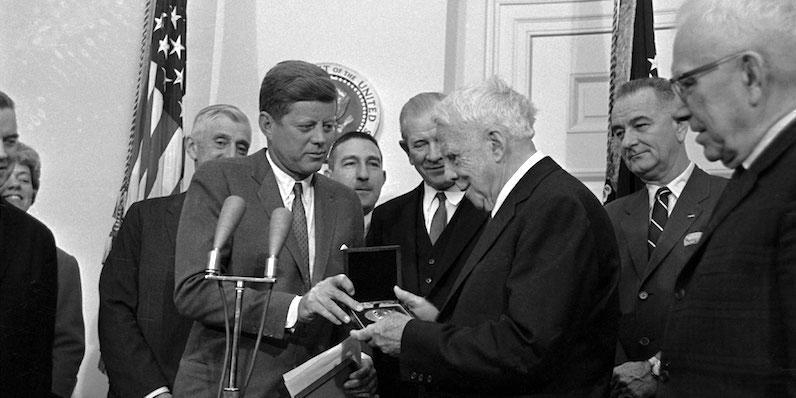The first poet to recite poetry at a president's inauguration: Who is Robert Frost?
He argued that the world is bad, yet it is necessary to struggle to live. Although he opposed industrialization and its effects, he also revealed that this was an inevitable development.

American poet. Frost, who settled in New England at the age of 10, became one of the poets who best interpreted this region.
Frost was born on March 26, 1874, in San Francisco, California. He spent the first 11 years of his life there, until his journalist father, William Prescott Frost Jr, died of tuberculosis. After his father's death, Frost moved with his mother and sister, Jeanie, to Lawrence, Massachusetts, with his grandfather.
-
Name: Robert Frost
-
Born: March 26, 1874
-
Died: January 29, 1963
-
Occupation: American poet
He completed his secondary education in Massachusetts and worked at various jobs after attending Dartmouth College for a short time.
Married in 1895, Frost entered Harvard two years later. In 1912, he moved to England with his family. He returned to the United States at the age of 40. He saw his fame reach his country before him. He received many offers from universities, publishers, and publishing houses. His works were published repeatedly.
He has won the Pulitzer Prize 4 times. A new idyllic mood prevailed in many of Frost's poems. In the poem, he tried to capture a symbolic meaning based on observation. Known as a local poet, Frost succeeded in reaching the universal by starting from the local.
Major works: "A Boy's Will" (1913), "North of Boston" (1914), "Mountain Interval" (1916), "West - Running Brook" (1928), "A Masque of Reason" (1945), " A Masque of Mercy" (1947).
Unlike other poets of his period, Frost did not deal with urban life, and the main themes of his poetry were the sensibilities of rural people and nature. Instead of form experiments, he preferred a plain expression with the usual measures and rhythms. However, behind this easy narrative, there is a subtle style that masterfully captures the details in nature that cannot be noticed at first glance and a wise attitude that becomes mystical from time to time. Dramatic monologues and dialogues are the most prominent feature of his poetry.
One of Frost's famous poems is Mendy Wall. In this poem, the poet describes his conversations with his farm neighbor on the common wall. The poet's neighbor shows meticulousness in repairing the wall, ignoring the good relationship between them, even though there is no apparent reason. Because all these kinds of border markers are the necessities of good neighborliness. Although the poet advocates a more advanced and free idea, he helps his neighbor by repairing the ruined wall separating the properties to maintain good neighborliness. With the land on either side of this wall, perhaps our narrow self, a barrier built by fear, suspicion, and secrecy that we have erected between the wall and our essentially separated personalities, perhaps, in a broader sense, the ridiculousness of the traditions that are not based on social interests between people. Because R. Frost leaves it to his readers to finish what he wants to say many times as a result of a writing style he always follows, although he is not a poet of deep soul analysis and complex human trials.
Firsts and Unforgettable Moments from the Oath Ceremonies
Since the first President of the United States, George Washington, the inauguration ceremonies, in which presidents officially take office after the elections, have also evolved.
The swearing-in ceremonies are a simple process and involve the new president reading a 35-word oath on the date stipulated by the Constitution.
Despite this, swearing-in ceremonies have had many principles and interesting main scenes throughout history, have developed over time, and gained new qualities.
Poetic ceremony
John F. Kennedy became the first president to add a poet to the inauguration event, but things didn't go as planned. The American poet Robert Frost, who was 86 at the time, was planning to recite a poem he had prepared just for that day at the swearing-in ceremony, but the lines of light reflected on the page made it difficult for him to see. Lyndon Johnson tried to cast a shadow on the page with his hat, but instead, Frost gave up the poem he had planned to read and recited another poem of his own that he knew by heart.
